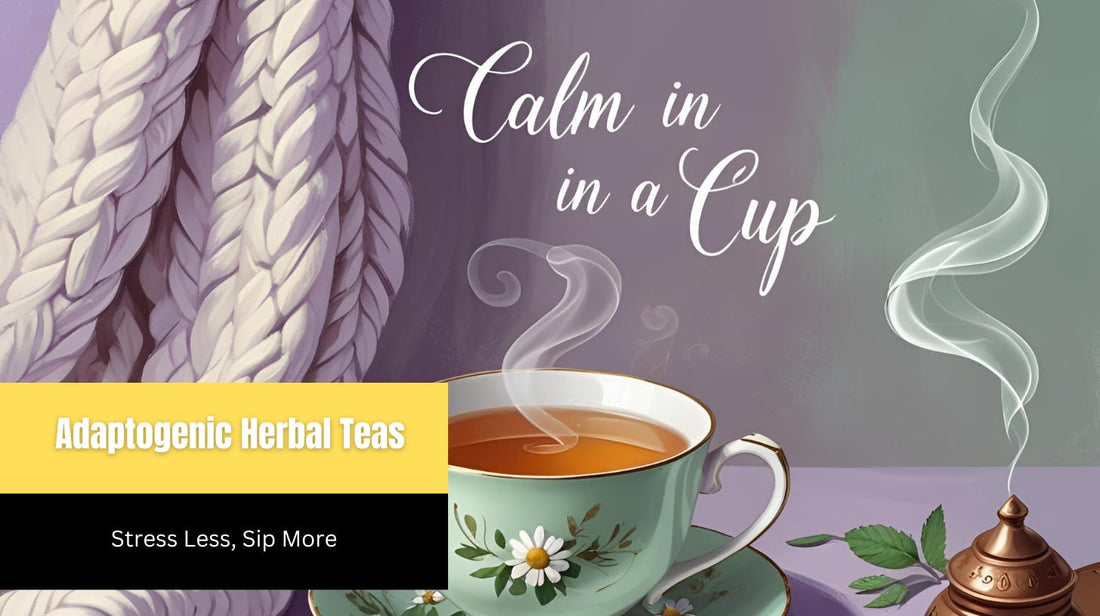
Adaptogenic Herbal Teas: Stress Less, Sip More
Sip Your Stress Away
Modern life is, well… a lot. Between work, family, news cycles, and that never-ending to-do list, it’s no wonder our stress levels are permanently hovering at DEFCON 3. But before you reach for another cup of jitter juice (aka coffee), consider this soothing alternative: adaptogenic herbal teas.
Adaptogens are nature’s chill pills. They help your body adapt to physical, mental, and emotional stressors—and when they come in tea form, they also taste amazing.
Let’s dive into how these teas can help you breathe easier, sleep better, and feel more like a human again.
What Exactly Are Adaptogens?
Adaptogens are herbs and roots that support your body’s ability to handle stress. They work by regulating your adrenal system, which is responsible for managing your hormonal response to stress.
In simple terms: adaptogens don’t sedate you—they help you adapt.
Some superstar adaptogenic herbs include:
- Ashwagandha: Great for anxiety, brain fog, and burnout.
- Tulsi (Holy Basil): Calms the mind, supports immunity.
- Licorice Root: Supports adrenal health and energy levels.
- Moringa: Nutrient-rich, balances mood and fights fatigue.
- Rhodiola Rosea: Boosts energy and mental stamina.
The Benefits of Adaptogenic Herbal Teas
Here’s what makes adaptogenic teas such a game-changer:
1. They reduce stress without sedating you.
Unlike pharmaceuticals or alcohol, adaptogens help balance your stress hormones naturally.
2. They support long-term resilience.
Over time, they train your system to stay calmer under pressure.
3. They’re caffeine-free (mostly).
You get calm energy without the crash.
4. They’re full of nutrients.
Many adaptogens contain antioxidants, vitamins, and anti-inflammatory properties.
5. They taste amazing.
From earthy to floral to spicy-sweet, these teas are as enjoyable as they are functional.
Meet the Stress-Fighting Stars
1. Ashwagandha
Known for helping with anxiety, fatigue, and brain fog.
How it tastes: Slightly bitter, earthy—best in a blend or with cinnamon and honey.
Try it: Combine with tulsi or ginger for a stress-busting blend.
2. Tulsi (Holy Basil)
Calms the mind, lifts the mood, and supports the immune system.
How it tastes: Fresh, slightly peppery, and a little minty.
Try it: Danfe Tulsi Green Tea– a beautiful combo of tulsi and green tea for gentle focus.
3. Moringa
An adaptogen and a superfood, packed with iron, calcium, and vitamin C. Supports energy and reduces inflammation.
How it tastes: Mild, grassy, similar to green tea.
Try it: Danfe Moringa Herbal Tea – nourishing and energizing without caffeine.
4. Licorice Root
Soothes the digestive system and supports adrenal recovery.
How it tastes: Naturally sweet with a slightly spicy kick.
Note: Use occasionally and avoid if you have high blood pressure.
5. Rhodiola
Fights fatigue and supports mental clarity.
How it tastes: Earthy with a slightly floral aroma. Often used in blends.
How to Brew the Perfect Cup
- Use filtered water. Your herbs deserve quality water.
- Steep longer than regular tea. Adaptogenic herbs need about 6–10 minutes to release their full benefits.
- Add extras for taste and boost. Try lemon, cinnamon, ginger, or honey.
- Make it a ritual. Tea time = me time. Breathe, sip, and slow down.
When’s the Best Time to Drink Adaptogenic Tea?
Morning: Moringa or Tulsi for calm focus.
Afternoon: Rhodiola or Ashwagandha to prevent burnout.
Evening: Chamomile + Ashwagandha to wind down (and skip Netflix autoplay).
Real Talk: Does It Really Work?
Yes—but don’t expect a miracle after one cup. Adaptogens work over time. Like yoga or meditation, consistency is key.
Many people report feeling:
- Less anxious and reactive
- More focused at work
- Better sleep quality
- More balanced moods
It’s not about sedation—it’s about stability.
Explore stress-supporting herbal teas at DanfeTea.com and start your calm-sipping ritual today. Because balance tastes better when it’s brewed.
FAQs
Q: Can I drink adaptogenic tea every day?
Yes! In fact, they’re most effective when consumed regularly.
Q: Are adaptogenic teas safe for everyone?
Mostly, yes—but check with your doctor if you’re pregnant, breastfeeding, or on medication.
Q: Can I take adaptogens with caffeine?
Yes, but if you’re trying to reduce stress, cutting caffeine helps.
Q: What’s the difference between adaptogens and regular herbal teas?
Regular herbal teas may relax or energize you, but adaptogens specifically help regulate stress and hormonal balance.
Q: How long until I feel the effects?
Some feel calmer after just one cup, but real changes often appear after 1–2 weeks of consistent sipping.
Final Sip: A Calmer You Is Just a Cup Away
In a world that never stops spinning, adaptogenic herbal teas give you permission to pause. They’re not just a trend—they’re a timeless way to care for your nervous system and reconnect with yourself.
So next time the day feels too heavy, skip the second espresso and go for a calming blend instead. Your body—and your brain—will thank you.










